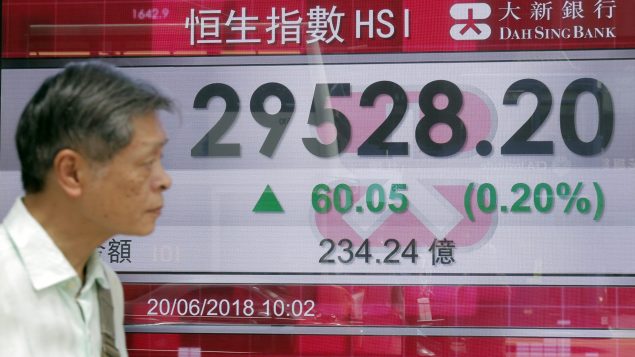The financial world is waiting and watching the escalating tariff dispute between China and the United States amid fears an all-out trade war would hurt economies around the world. Together, China and the U.S. represent about half the world economy. A tariff battle could result in price inflation and consumer debt slowing the economies of both countries and rippling around the world.
Biggest economies ‘slugging it out’
“It’s like a heavy weight prize fight. You’ve got the two biggest economies in the world that are sort of slugging it out with each other,” says William Watson, retired professor of economics at McGill University and columnist with the Financial Post weekly.
Listen
William Watson says if China and the U.S. go through with threats to impose tariffs a recession could follow.
Possible short term gain for Canada
If all the tariffs threatened by the U.S. and China are enacted, prices for imported goods will eventually increase for consumers in both countries. Watson says that in the very short term, that might make Canadian goods less expensive assuming they don’t face tariffs too. The U.S. has already imposed tariffs on Canadian steel and aluminum and is threatening to do the same with cars and trucks.
But in the longer term, if China and the U.S. do not negotiate some solution to this trade dispute, Watson says Canada and the world will suffer.
Recession could result
“If both of those super economies slow down, we’re going to be able to sell less. That’s going to mean less output, fewer jobs in Canada. And if the U.S. and China go into recession, we’re not going to avoid a recession,” he says. Nor will the rest of the world.
The first volley in this battle was launched on June 15, 2018 when U.S. President Donald Trump announced a 25 per cent tariff would be levied on $50 billion worth of goods imported from China. When he campaigned for the presidency he promised to tackle what he called Chinese cheating in trade. “There’s a worldwide consensus that China cheats, maybe more than most countries cheat,” says Watson.
Several issues irritate U.S.
“He (Trump) doesn’t want them to subsidize exports, doesn’t like the fact that many exports are produced by government companies that don’t have to make a profit and don’t have to pay very much for the money the borrow from the state, and also the fact that China allegedly steals technology either by spying in the traditional industrial way or by inviting people to come…invest in China but to do so, in joint ventures with a Chinese company that then learns a fair amount about the technology that helps run the investor foreign company.”

China says it will retaliate against the U.S. by imposing matching tariffs on American products like bourbon. (Ed Reinke/AP Photo/file)
Who has the bigger stick?
China responded to the initial announcement of tariffs by saying it too would levy a charge of 25 per cent on $50 billion worth of goods coming from the United States. Then on June 18, Trump threatened further tariffs of 10 per cent on $200 billion more of Chinese products. Watson says China will have trouble matching that because it only imports a total of about $180 billion worth of goods from the United States.
But he says China can apply pressure in other ways and he notes that China holds a substantial amount of U.S. debt and that may provide it some leverage.
The tariff threats initially sparked declines in stock markets. Results were later mixed as the financial world waits to see what happens next.







For reasons beyond our control, and for an undetermined period of time, our comment section is now closed. However, our social networks remain open to your contributions.